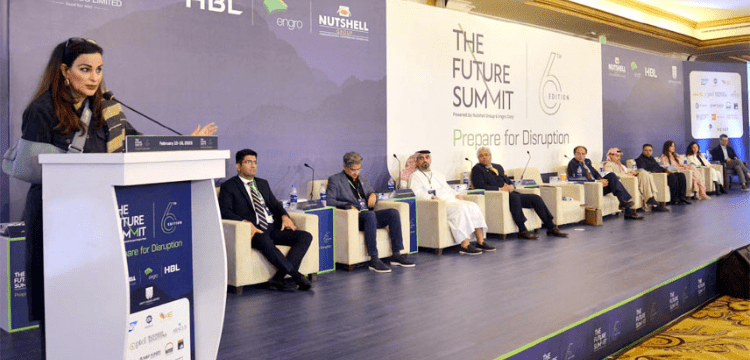[vc_row][vc_column][vc_column_text dp_text_size=”size-4″]KARACHI: According to Federal Minister for Climate Change Sherry Rehman, large corporations are to blame for global warming, and it is now their turn to take the initiative in leading the country out of this problem.
The minister stated during his speech at the sixth “The Future Summit,” hosted by the Nutshell Group, that large corporations, many of which were larger than states, were responsible for 71% of global warming over the previous 100 years. That is also true in this country (Pakistan),” she stated.
She commented that businessmen, not governments, were to blame for the toxicity of the climate.
Businesses have to take the lead because they are the ones who contribute a lot to climate change in the shape of producing tons of plastic and other forms of pollution nationwide, she stressed.
“I am not abdicating responsibility at all, I am taking full responsibility, but climate change adaptation is not done in a vacuum, we cannot adapt to the strategies in Islamabad in a small or big office. It is done in people’s hearts, at homes, businesses, schools and communities,” she underscored.
Every company is generating huge waste. They are not processing the waste. And they are not building recycling protocols in a big business, which is the case everywhere in the world.
Only 25% of businesses are reporting compliance with the Sustainable Development Goals (SDGs) but there is a huge gap.
The minister announced that regulations would be rolled out soon for the extended use of plastics and declared a war against plastic vendors to force them to disclose their production data.
She emphasised that ignoring the climate challenges would be foolish because they would prevent Pakistan and its economy from moving forward. Rehman noted that the nation “needs a big amount of $348 billion to battle climate change till 2030.”
“The year 2030 will make a difference for Pakistan and other resilient nations. You must take all necessary steps now, as there will be so many accelerated climatic events by that time that nobody will be safe, including the economy, businesses, houses, and especially vulnerable communities.
K-Electric CEO Moonis Alvi said KE, Karachi’s sole power vendor, had applied for the renewal of its distribution licence, as its 20-year monopoly of exclusively selling electricity in the city of ports would come to an end in June 2023.
“K-Electric has filed for the renewal of its licence on a ‘non-exclusivity’ basis,” Alvi announced while speaking at The Future Summit. “The power utility has filed for the licence renewal, but the company has not sought exclusivity.”
KE’s application for a non-exclusive distribution licence means that other companies may be awarded licences to distribute electricity in Karachi.
Alvi said people thought that the company was enjoying exclusivity, “let me tell you, we are not enjoying.”
As part of the KE’s plan submitted for regulatory approval, the company plans to incorporate renewables up to 30% of its fuel mix by 2030 to meet Karachi’s expected total demand for 5 gigawatts.
According to Alvi, the business just inked an MoU with China Three Gorges, a Chinese power company that specialises in making investments in renewable energy.
Imagine being able to import hydrogen energy via wheeling, lowering the cost of electricity for our varied group of clients, he continued.
“The most recent tariff rise is a band-aid fix, not a long-term answer. When tariffs rise, the recovery suffers, losses rise, and there is a subsequent fiscal imbalance that is added to the total circular debt.
“Since we are a privately held corporation, we don’t increase the circular debt. In actuality, we, our investors, and our borrowing—whose costs have increased—will bear the losses we are experiencing.
Speaking during the conference, HBL President and CEO Muhammad Aurangzeb stated that the World Bank predicted Pakistan’s economy will grow from its current worth of $300 billion to $3 trillion by the year 2047. Pakistan must maintain stability in its policies if it is to experience future economic progress.
Jazz President and CEO Aamir Ibrahim emphasised the need for universal access and said Pakistan should initially concentrate on 4G rather than 5G. Only 1% of the population may benefit from 5G, which is very expensive.[/vc_column_text][/vc_column][/vc_row][vc_row][vc_column][vc_column_text]
[/vc_column_text][/vc_column][/vc_row]











